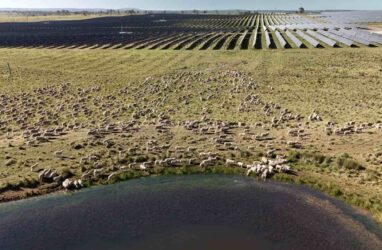Feed aggregator
COP28: Organisations launch carbon data dashboard with integration from major registries
COP28: Roundup for Day 13 – Dec. 12
COP28: Australia, UK partner on hydrogen funding initiative
WTO chief urges countries to prioritise subsidies that tackle climate crisis
Ngozi Okonjo-Iweala says current incentives are distorting world trade and hampering fight against climate breakdown
Governments must start to distinguish between the good subsidies they need to fight the climate crisis and the bad ones that are increasing greenhouse gas emissions, the world’s trade chief has said.
Subsidies and other incentives to burn fossil fuels and encourage poor agricultural practices, amounting to about $1.7tn a year, are distorting world trade and hampering the fight against climate breakdown, Ngozi Okonjo-Iweala, the director general of the World Trade Organization, told the Guardian.
Continue reading...A robin: inside her small dark eye, a quantum entanglement | Helen Sullivan
A symbol of spring and rebirth, the robin is a favourite of gardeners and inspiration for poets and dreamers
What is it about the poem “Who killed Cock Robin?” It is so sad, and so coolly dark: a miniature drama played out in the shade of a single tree. The sparrow confesses right away, and nobody minds. The fly – “I, said the fly, with my little eye, I saw him die” – is a witness of whom no questions are asked. Everyone seems eager for the burial, eager to help, insincere in their mourning, “a-sighing and sobbing”.
Everything is small. The fish catching blood in his “little dish”, the rook playing parson with his “little book”. The death of a little bird, and a funeral for a bird the size, and almost the shape, of an orange, and weighing no more than an orange segment.
One of the electrons migrates a few nanometers away, where it feels a slightly different magnetic field than its partner. Depending on how the magnetic field alters the electron’s spin, different chemical reactions are produced. In theory, the products of many such reactions across a bird’s eye could create a picture of Earth’s magnetic field as a varying pattern of light and dark.
Continue reading...Tasmania approves first solar farm and giant battery as rooftop PV hits record high
 The first big solar farm in Tasmania obtains council approval, just as rooftop PV output hits a record high in the island state.
The first big solar farm in Tasmania obtains council approval, just as rooftop PV output hits a record high in the island state.
The post Tasmania approves first solar farm and giant battery as rooftop PV hits record high appeared first on RenewEconomy.
Whale filmed swimming with Australian beachgoers dies after stranding
Petro-states and fossil fuel lobby steer climate deal towards global catastrophe
 The world's petrol states and the fossil fuel lobby are steering the world towards climate catastrophe. And Australia's Coalition is cheering on from the sidelines.
The world's petrol states and the fossil fuel lobby are steering the world towards climate catastrophe. And Australia's Coalition is cheering on from the sidelines.
The post Petro-states and fossil fuel lobby steer climate deal towards global catastrophe appeared first on RenewEconomy.
CP Daily: Monday December 11, 2023
Koalas suffer in the heat – here's how to help this summer
Massachusetts’ proposed Clean Heat Standard draft framework faces pushback from propane suppliers
Washington updates proposed cap-and-invest legislation with eye on linkage
Solar costs are now nearly 30 per cent lower than cheapest fossil fuel option, EY says
 EY says solar PV remains cheapest source of new-build electricity, with a global weighted average levelised cost of electricity 29% lower than the cheapest fossil fuel alternative.
EY says solar PV remains cheapest source of new-build electricity, with a global weighted average levelised cost of electricity 29% lower than the cheapest fossil fuel alternative.
The post Solar costs are now nearly 30 per cent lower than cheapest fossil fuel option, EY says appeared first on RenewEconomy.
EVs and heat pumps can make 10% of German electricity demand flexible by 2035
 Electric cars, heat pumps and home storage systems will be able to deliver around 100 terawatt hours of flexible electricity in Germany.
Electric cars, heat pumps and home storage systems will be able to deliver around 100 terawatt hours of flexible electricity in Germany.
The post EVs and heat pumps can make 10% of German electricity demand flexible by 2035 appeared first on RenewEconomy.
Revealed: more than 160 representatives with climate-denying track records got Cop28 access
UN organizers allow groups that have obstructed fossil fuel regulations and other climate action to attend, watchdog finds
Influential industry trade groups, thinktanks and public relations agencies with a track record in climate denialism and misleading the public have been given access to the UN climate talks in Dubai, the Guardian can reveal.
Corporate Accountability, a transparency watchdog, has found that UN organizers greenlighted access to groups that have obstructed fossil fuel regulations and other climate action, giving them the same or greater access to the international negotiations as Indigenous communities, human rights groups and climate justice organizations.
Continue reading...COP28: Climate mums make themselves heard in halls of power
Could there be a gold rush for buried hydrogen?
The great climate Cop-out: harnessing the power of a load of hot air | Fiona Katauskas
Scientists call for retraction of study that questioned REDD projects
Australia’s biggest solar farm reaches peak output, now to host 6,000 sheep
 New England solar farm reaches full output and now plays host to 2,000 sheep, a number that will treble in coming months, making it the biggest mob of sheep doing solar grazing in Australia.
New England solar farm reaches full output and now plays host to 2,000 sheep, a number that will treble in coming months, making it the biggest mob of sheep doing solar grazing in Australia.
The post Australia’s biggest solar farm reaches peak output, now to host 6,000 sheep appeared first on RenewEconomy.



